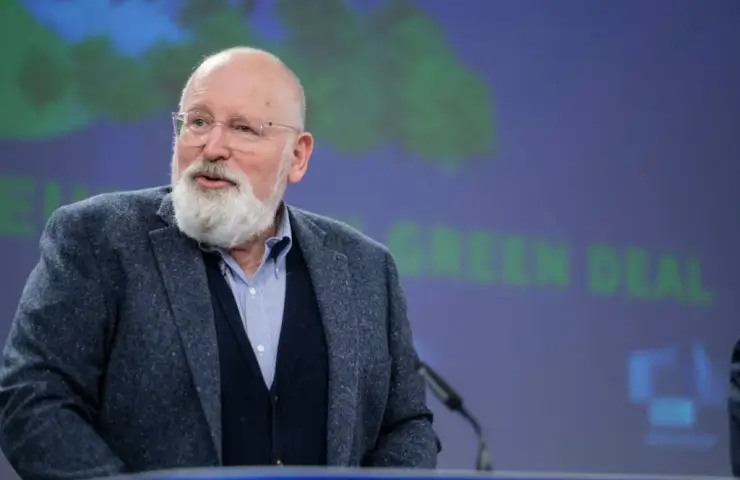Hydrogen will be essential for Europe's future economy, in particular for storing and transporting green energy, EU climate chief Frans Timmermans told the European Parliament.
"I am a firm believer in green hydrogen as the driving force behind our energy system of the future," Timmermans said at a meeting with the European Parliament's environmental committee on 28 April.
“Hydrogen will be a key element of our future economy,” he added during a discussion highlighting the impact of the war in Ukraine, the state of Europe’s new climate legislation, and food security.
Strategic alliances
The meeting took place after Russia cut off gas supplies to Poland and Bulgaria, and the EU is trying to phase out Russian fossil fuels.
Timmermans noted that at the same time, this means that Europe will need more liquefied natural gas (LNG) and gas from other partners' gas pipelines. This fuel must come from a variety of supplier countries so that the EU does not become overly dependent on one, he added.
One of the problems, however, is that many suppliers are looking for long-term contracts for fossil gas, but see that demand in Europe is likely to decrease as it decarbonizes and turns to renewable energy.
Thus, the European Commission is proposing a long-term partnership that will start with LNG supplies and end in a hydrogen economy, according to Timmermans.
“Will it be like linking to LNG? Not if we propose long-term cooperation projects moving towards hydrogen,” he explained.
Timmermans envisions a hydrogen economy around the Mediterranean, where each country depends on the other, and each has a "share in this production, distribution and use of green hydrogen."
This is the future, says Timmermans. “Yes, you are creating more stability in the geopolitical system. In this way, you open up huge opportunities for the development of Africa.
The EU is already looking beyond its borders when it comes to upcoming supplies of renewable hydrogen. Germany, in particular, is trying to build partnerships with countries such as Australia and North Africa.
According to Timmermans, while Europe has "difficult relationships" with countries such as Egypt and Turkey, these countries are going to produce renewable energy "in quantities that exceed their own needs."
The ideal, he says, would be to transport renewable electricity via cable from European partners to the EU, but where this is not possible, energy can be stored in hydrogen or ammonia and transported to Europe.
It will also provide the EU with more green hydrogen to help decarbonise highly electrified sectors, including aviation and heavy industry.
"Europe will never be able to produce its own hydrogen in sufficient quantities," said Timmermans.
He added that the best option for the European Commission is green hydrogen produced from renewable energy sources, but blue hydrogen produced from fossil gas with carbon capture and storage to combat emissions would also be a temporary option.
Innovations
Timmermans also warned lawmakers that Europe's energy system will have to adapt to allow the influx of renewables and balance their flexibility. This includes smart grids that enable the two-way flow of electricity and reduce peak demand, increased storage - batteries, and hydrogen and ammonia.
The process of producing hydrogen from water and electricity - electrolysis - should also become more efficient, Timmermans said.
“The bottom line is that the hydrogen economy will not work unless the grid and storage problem is solved, which is understandable, because you will be generating a lot of electricity in places where you do not need electricity, so you need to get energy there, where it is needed, so some part will be in clean electricity, but part will go through electrolysis into hydrogen, ammonia or a mixture,” he explained.
But others are less convinced of a hydrogen future. At the meeting, centrist MEP Nils Torvalds warned against "hydrogen hype" in Europe, pointing to reports of hydrogen leakage and its impact as a greenhouse gas.
A study by the UK Department of Business, Energy and Industry Strategy has warned that hydrogen is, at best, six times worse for the climate than CO2 over a 100-year span.
“I think we need to reassess what we can do with the hydrogen part of energy, because now I have the feeling that we are dreaming about what hydrogen can give us,” Torvalds told Timmermans.




